“Body, My House,” is the theme of new editor Maria Melendez’s first issue. “Human bodies, alive and in crisis, command the spotlight in the non-fiction books that have held my attention for the last 18 months,” she tells us in her “Welcome.” This is possibly, she reveals, the result of bodies in crisis in her own life, first her father’s triple bypass surgery, and later bouts of H1N1 from which she and family members suffered. There is certainly much writing about the experience of illness and disease in this issue, but there is also a good deal of work about food and eating; the body’s connection to the natural world; reproduction and aging; an essay about quitting smoking; and a poem about the art of maintaining a home as art (“this house is my poem!”). Continue reading “Pilgrimage – 2010”
NewPages Blog
At the NewPages Blog readers and writers can catch up with their favorite literary and alternative magazines, independent and university presses, creative writing programs, and writing and literary events. Find new books, new issue announcements, contest winners, and so much more!
Pilgrimage – 2010
Spread the word!
Prole – 2010
Prole is proudly launching its inaugural voyage, and what a voyage. The message on page two states that this is “a journal of accessible poetry and prose to challenge and engage.” This journal is nothing if not challenging and engaging. Prole’s fiction and prose uses only artful story-telling, skillful-weaving, compact wording; no literary tricks, twists, surprise endings or jolts to deliver one deep into their vast little worlds. There are short stories with suspense and horror, such as “Book Covers” by Rebecca Hotchen and “Flower as Big as the Sky” by Matt Dennison. There are minute character studies such as “Shoes” by Dave Barrett and Bruce J. Berger’s “He had to Go.” And completing this tasty assortment are the odd and sad like “Stone and Wind” by Carl T. Abt, “Scarred” by Kevin Brown, and Stephen Ross’s “Clocks without Hands.” Continue reading “Prole – 2010”
Spread the word!
Red Cedar Review – 2010
Interviewed in this issue by Jim Porter, master of prose style Richard McCann defines voice as a function of rhythm (Ms. Woolf was right, of course!) and describes his process of walking around memorizing his own words as they come to him. I have never heard this process described before (which is, for what it’s worth, exactly the way I compose poetry) and I appreciated McCann’s candor. His interview is one of the highlights of the issue. Continue reading “Red Cedar Review – 2010”
Spread the word!
Smartish Pace – 2010
The work in Smartish Pace is just what the journal’s title suggests, accomplished and sophisticated. The issue features many poets whose reputations are entirely in keeping with that categorization (Gerald Stern, Eamon Grennan, Carol Muske-Dukes, Terrance Hayes, Barbara Ras, Kim Stafford, William Logan, Sandra McPherson, Amjad Nasser of Egypt, Norman Dubie, and Michael Collier); and many others whose poems are no less accomplished or sophisticated (Steven Cushman, Terence Winch, Casey Thayer, Patrick Ryan Frank, and Katie Ford, among others).
Spread the word!
Sonora Review – 2010
The bright, colorful, fun, full bleed cover with its octopus, crab, and turtle swimming from margin to margin says it all. It announces Number 57’s theme (“The Sea Issue”); the journal’s tone (delightful, playful, forward moving); and its voice (a little over the top, “Featuring the riveting poetry of Jeffrey McDaniel; the unputdownable fiction of Amelia Grey, and the dazzling nonfiction of Steven Church” the cover copy shouts). The journal is produced by graduate students in the Department of English at the University of Arizona in Tucson. Ah, but the faculty advisor is Ander Monson. Well, now I get it! Monson is the inventive and clever editor of the online journal diagram (and a lot of great stuff in print) and the publisher of hybrid and graphically oriented work at his New Michigan Press. His students are learning their lessons well. The journal is really inventive. Really fun. And, despite some excesses, really successful at what it does, beginning with the illustrated instructions on how to read the journal. Continue reading “Sonora Review – 2010”
Spread the word!
Tiferet – 2010
Tiferet is an independent “multi-faith publication dedicated to promoting peace in the individual and in the world,” published six times annually (two print issues and four online issues). Issue 13 features five essays (most are excerpts from forthcoming or recently published books); three short stories; the work of a dozen poets; black and white photographs by Taoli-Ambika Talwar and a drawing by Israel Carlos Lomovasky. The large format is ideal for Talwar’s exceptional photographs, three images that couldn’t be more different from each other (a close-up of a blossom; a distanced view of a house in the woods; and a close-up of a wall of granite rock), except for the skill and creativity of their composition. Continue reading “Tiferet – 2010”
Spread the word!
upstreet – 2010
Upstreet is an award-winning publication that claims to have “the best new fiction, poetry and creative non-fiction available” to “offer a voice to prose writers and poets who might not find publication in more mainstream journals.” However “mainstream” might be defined, whether these pieces are off-beat, they are definitely striking and high-quality. Choosing which poems and short-stories to comment on is almost a random process; there is good variety, and the quality is consistent. The size of the journal is typical of any paperback; about two hundred pages, sporting a shiny black cover with the title printed in bold orange on the front. Continue reading “upstreet – 2010”
Spread the word!
The Writing Disorder – Summer 2010
This is a brand spanking new lit mag with only two issues published, but one which shows considerable promise. The website is pleasant and easy to negotiate and there is a wide variety of material to choose from: fiction, nonfiction, poetry, paintings, comic art, photography, interviews, and reviews. I had so much fun I delved into their single archive to get a taste of everything. Continue reading “The Writing Disorder – Summer 2010”
Spread the word!
Passings :: Ron Offen
 Ronald (Ron) Charles Offen, 79, of Glenview, Illinois, died on August 9th in Glenview. The cause of death was cancer.
Ronald (Ron) Charles Offen, 79, of Glenview, Illinois, died on August 9th in Glenview. The cause of death was cancer.
Ron was born October 2, 1930 in Chicago to Charles Offen and Ellen Shirreffs Offen. He graduated from Austin High School, received an A.A. from Wright College and an M.A. in English Language and Literature from the University of Chicago. In the 1970s and 1980s he lived in Southern California and was delighted to return to the Chicago area in 2001.
He was divorced from his first wife, Sharon Nealy; his second wife, Rosine Brueckner Franke, died in 2001. He is survived by his third wife, Beverly Kahling Offen, his sister, Pam (Charles) Veley, his children, Eric (Diane) Offen and Deirdre (Don) Junta, Michele Offen and Darren (Beatriz) Offen, five grandchildren, and five great-grandchildren.
Ron held many jobs, from taxi driver to insurance investigator to middle school library assistant. But the force that gave his life meaning was always the written word; he was an author, a poet, playwright, editor, and theater producer.
In 1989, after a bout with cancer, he thought about how important poetry had been to him and how much it had given him. To give something back to poetry and poets, he started the magazine Free Lunch, with the commitment to give all serious poets in the U.S. a free subscription and also to comment on all work submitted to him. Free Lunch has published many of the best-known contemporary American poets. In 2009, due to his illness, publication of the magazine ceased.
Ron loved his wife, his children, his many friends, poetry, trees, the color orange, playing the trumpet and the piano, cookies, contemporary art and architecture, WFMT, caring for his collection of house plants, books, turtles, jazz, Bach and Chopin, swimming, the Midwest, and evenings at home.
There will no funeral services. A memorial celebration will be scheduled.
Ron’s papers are archived in Special Collections at the University of Chicago. Memorial donations may be made to the University of Chicago with an indication that they are intended for support of Special Collections. Send to Judy Lindsey, Director of Development, University of Chicago Library, 1100 East 57th Street, Chicago, IL 60637.
[Text provide by Beverly Offen.]
Spread the word!
Mid-American Review Contest Winners
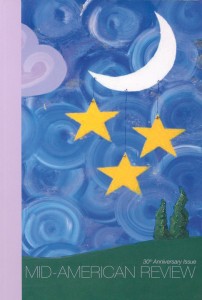 The latest double issue of Mid-American Review (v30 – 1&2) celebrates the 30th anniversary of the publication with and Featured Poet Tony Trigilio. Included within the whopping 400+ pages are winners and select finalists of the following contests:
The latest double issue of Mid-American Review (v30 – 1&2) celebrates the 30th anniversary of the publication with and Featured Poet Tony Trigilio. Included within the whopping 400+ pages are winners and select finalists of the following contests:
Jill Haberkern, winner of Mid-American Review’s Sherwood Anderson Fiction Award
Editors’ Choice – Nick Kocz and Jeffrey Martin
Kimberly Davis, winner of the James Wright Poetry Award
Editor’s Choice – Casey Thayer and Gretchen Steele Pratt
Alan Michael Parker winner the Fineline Competition for Prose Poems, Short-Shorts, and Anything In-Between
Editors’ Choice – Kelli Boyles, Jaime Brunton, Ashley Davidson, Cherie Hunter Day, Richard Garcia, Ian Golding, Nina Mamikunian, Alan Michael Parker, and Jennie Thompson
Also included in this issue are the 2009 AWP Intro Journals Awards – Kayla Skarbakka and David Lumpkin.
Spread the word!
New Lit & More on the Block :: Storychord
Every other Monday, Storychord.com features one story, one image, and a one-song “soundtrack” – each by a different underexposed, talented up-and-comer. All issues are thoughtfully curated by Sarah Lynn Knowles (SARAHSPY, The Furnace Review).
Currently available on the site are:
Written works by Katharine Tillman, Dan Lopez, Miles Klee, Duncan Birmingham, David Fishkind, Amanda McCarty, Amanda Kimmerly, Greg Turner, Tao Lin
Artwork by Soo Im Lee, Anna Moller, Mike Dote,Sarah Fletcher, Omar Bakry, Nika States, Crystal Barbre, Ericka Bailie-Byrne, Helena Kvarnstr
Spread the word!
OneWord Online Writing Exercise
OneWord is an online writing prompt that provides user with – yes – one word on which they have 60 seconds to write. The site advises against word definitions and writing about freaking out because you don’t know what the word means. Instead, they say to write whatever the word “inspires” and that the point to the exercise is to “learn to flow.” Over 4000 members access the site and sign-up is free. Anyone who visits the site can see the word and be given the timed screen on which to write without having to sign up – so you can check it out before committing to sharing your writing. For those who do share and/or want to read, you can see posts by other members. OneWord is a self-monitored community of writers, and has announced the publication of 365 Days: A Year in the Life of OneWord.com. OneWord also includes a call-in podcast and has just begun a video series.
Spread the word!
WHR Tackles Literary Hybrid
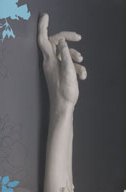 The newest issue of Western Humanities Review (v64.2 – not yet posted on their website as of this blog post) features Hybrid/Collborative Work. Even the Editors’ Note, which addresses the topic “What is Hybrid Work?” is a “Collaborative on a Conversation about Hybridity.” In in, the editors discuss the history of hybrid work as a genre, set forth a working definition of hybrid as a literary form, and discuss the benefits of hybrid as an alternative to conventional forms. The editors’ also
The newest issue of Western Humanities Review (v64.2 – not yet posted on their website as of this blog post) features Hybrid/Collborative Work. Even the Editors’ Note, which addresses the topic “What is Hybrid Work?” is a “Collaborative on a Conversation about Hybridity.” In in, the editors discuss the history of hybrid work as a genre, set forth a working definition of hybrid as a literary form, and discuss the benefits of hybrid as an alternative to conventional forms. The editors’ also  suggest moving away from rigid definitions of hybrid, which would allow us to “see hybrids everywhere, including critics’ discussion of ‘genre authenticity’ and “standards we have deemed ‘genre normative’.” An interesting and worthwhile editorial discussion for those interested in the issue of literary hybrids, and an volume of contributions to the discussion worth seeking out. If not for this, then definitely for the artwork by Kate MacDowell which graces the front and back covers as well as several pieces within.
suggest moving away from rigid definitions of hybrid, which would allow us to “see hybrids everywhere, including critics’ discussion of ‘genre authenticity’ and “standards we have deemed ‘genre normative’.” An interesting and worthwhile editorial discussion for those interested in the issue of literary hybrids, and an volume of contributions to the discussion worth seeking out. If not for this, then definitely for the artwork by Kate MacDowell which graces the front and back covers as well as several pieces within.
Spread the word!
Today’s SciFi Classics
Q: Which science fiction book first published within in the last 10 years will be considered a classic?
SciFi Signal’s Mind Meld panelists give their top picks.
Spread the word!
High Chair – Philippines Poetry Journal
Publishing since 2000, High Chair is a nonprofit small press that aims to promote genuine interest in poetry in the Philippines. The editor/s of the journal solicit work directly from poets, and also welcome unsolicitied poetry and prose submissions. High Chair online poetry journal publishes poetry, essays, interviews, book reviews and a section titled “Free Association.”
Until October 13, issue editors Kristine Domingo and Allan Popa invite interested writers to submit poems, essays, and reviews for possible inclusion in the 13th issue, which will be released in November this year. High Chair accepts works in Filipino and English.
Spread the word!
New Lit on the Block :: Psychic Meatloaf
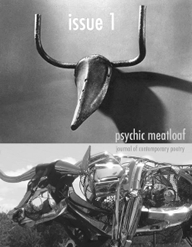 Edited by George McKim, Psychic Meatloaf publishes artwork and “free-verse and experimental poetry that is quirky and imaginative.” Every three months Psychic Meatloaf will e-publish the journal as a free downloadable pdf file and also self-publish the journal in print, which will be available for purchase.
Edited by George McKim, Psychic Meatloaf publishes artwork and “free-verse and experimental poetry that is quirky and imaginative.” Every three months Psychic Meatloaf will e-publish the journal as a free downloadable pdf file and also self-publish the journal in print, which will be available for purchase.
The first issue includes works from Felino A. Soriano, Gillian Prew, Philip Dacey, Maria Bennett, David McLean, Sam Schild, Amylia Grace, Robert Lietz, Bill Wolak, William Doreski, P.A.Levy, Michael Salcman, Amy Spraque, Howie Good, brian prince, Jory Mickelson, Heather Cox, Steve Mitchell, Serena M. Tome, J. P. Dancing Bear, Mark DeCarteret, Martha Clarkson, Michael McAloran, Mira Martin-Parker, justin wade thompson, Chuck Augello, Helen White, John Swain, Ashley Bovan, Rob Spiegel, Flower Conroy, Nicole Dahlke, Erik Hill, James Duncan, Gale Acuff, Monique Roussel, James W. Hritz, Tobi Cogswell, and Jeffrey Alfier.
Psychic Meatloaf is open for sumbissions and accepts up to six poems and up to three artwork images per submission.
Spread the word!
Passings :: Kevin Morrissey
Spread the word!
Reading for Moms (and the rest of us)
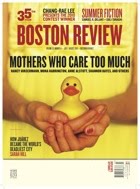
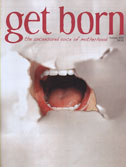 Side by side in the mail: get born: The Uncensored Voice of Motherhood and Boston Review cover story: Mothers Who Care Too Much (“What feminists get wrong about family, work, and equality”). Moms, you’ve got some good reading this month.
Side by side in the mail: get born: The Uncensored Voice of Motherhood and Boston Review cover story: Mothers Who Care Too Much (“What feminists get wrong about family, work, and equality”). Moms, you’ve got some good reading this month.
Spread the word!
Monologues! Get Your Monologues Here!
Editor-in-Chief [Sir] Tristram Stjohn Bexindale-Webb along with a staff that is a bit difficult to identify for certain other than Irish/American playwright and prose writer K.D. Halpin, have created a blog publication of monologues – The Good Ear Review: A Dramatists Literary Journal. Accepting submissions of “comedy, drama, and all the complexities in between” from both new and established writers, The Good Ear Review hopes to attract writers just as much as readers who will share in the idea that “monologues that are not only enjoyable to watch and/or listen to, but equally enjoyable to read. And read again.”
Currently featured on the site are monologues by Erin Austin, Claire Balfour, Andrew Biss, Kyle Bradstreet, Laura Camaione, Daragh Carville, Con Chapman, John Clancy, Doug Dolcino, John Hadden, K.D. Halpin, Alistair Hewitt, Eric Holmes, Penny Brandt Jackson, Jonathan Joy, Wayne Paul Mattingly, John McCann, Joshua Mikel, Robert Michael Morris, Benjamin Adair Murphy, LaTonia Phipps, Donald Steele, Dwight Watson, and Michael Weems.
Spread the word!
Video :: Bern Porter
From the official website of the Bern Porter Estate, scroll down or click on the Video link to see Joy Glows Where Confusion Was: A Film About, With, and Without Bern Porter created by Mark Melnicove for April 22, 2010 opening event for the exhibit: Lost and Found: The Work of Bern Porter from the Collection of the Museum of Modern Art Library.
Spread the word!
New Lit on the Block :: Devil’s Lake
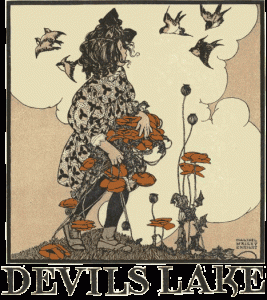 Devil’s Lake is published twice annually at the University of Wisconsin-Madison with a massive literary powerhouse masthead: Seth Abramson(Senior Editor), Lauren Berry (Senior Editor), Brittany Cavallaro (Editor in Chief), Kai Carlson-Wee (Design Editor/Assistant Fiction Editor), Louisa Diodato (Managing Editor and Webmaster), Josh Kalscheur (Poetry Editor), Christopher Mohar (Fiction Editor), Jacques J. Rancourt (Poetry Editor), Nancy Reddy (Review/Interview Editor), and Michael Sheehan (Fiction Editor). Devil’s Lake accepts submissions of poetry and prose online via Submissions Manager.
Devil’s Lake is published twice annually at the University of Wisconsin-Madison with a massive literary powerhouse masthead: Seth Abramson(Senior Editor), Lauren Berry (Senior Editor), Brittany Cavallaro (Editor in Chief), Kai Carlson-Wee (Design Editor/Assistant Fiction Editor), Louisa Diodato (Managing Editor and Webmaster), Josh Kalscheur (Poetry Editor), Christopher Mohar (Fiction Editor), Jacques J. Rancourt (Poetry Editor), Nancy Reddy (Review/Interview Editor), and Michael Sheehan (Fiction Editor). Devil’s Lake accepts submissions of poetry and prose online via Submissions Manager.
The inaugural Spring issue of Devil’s Lake includes:
Prose by Lucy Corin, Brian Evenson, John Holliday, PR Griffis, Andrew Malan Milward, and Ander Monson
Poetry by Erinn Batykefer, Brian Christian, Karin Gottshall, Anna Journey, Karyna McGlynn, Courtney Queeney, Martha Serpas, Alison Stine, Jeffrey Thomson, William Wright, and Mark Wunderlich
Spread the word!
Stunning Covers :: The Georgia Review
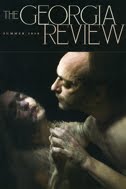 The Summer 2010 front and back covers of The Georgia Review feature photography by Connie Imboden, whose work is also beautifully reproduced in a full-color, glossy, center portfolio – “Danse Macabre” – introduced by Susan Ludvigson. The Georgia Review website shares several images along with Ludvigson’s intro.
The Summer 2010 front and back covers of The Georgia Review feature photography by Connie Imboden, whose work is also beautifully reproduced in a full-color, glossy, center portfolio – “Danse Macabre” – introduced by Susan Ludvigson. The Georgia Review website shares several images along with Ludvigson’s intro.
Spread the word!
Granta on Mark Twain
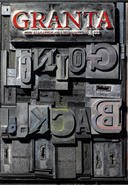 The newest issue of Granta (111) is themed “Going Back” and features an excerpt from Mark Twain’s never before published and forthcoming autobiography. Twain himself barred anyone from publishing the text until 100 years after his death. This fall, the University of California will release Volume 1 of Twain’s text. “The Farm” is available to read in the issue, and online at Granta, Benjamin Griffin writes on editing the autobiography (A Voice from the Vault) and Malcolm Jones offers his commentary, “Where do we put Mark Twain?” – on trying to place a literary great. Several other links to Twain-related sites and projects are also included, as well as images from Twain’s original text.
The newest issue of Granta (111) is themed “Going Back” and features an excerpt from Mark Twain’s never before published and forthcoming autobiography. Twain himself barred anyone from publishing the text until 100 years after his death. This fall, the University of California will release Volume 1 of Twain’s text. “The Farm” is available to read in the issue, and online at Granta, Benjamin Griffin writes on editing the autobiography (A Voice from the Vault) and Malcolm Jones offers his commentary, “Where do we put Mark Twain?” – on trying to place a literary great. Several other links to Twain-related sites and projects are also included, as well as images from Twain’s original text.
Spread the word!
Writers Houses
Newly launched labor of love by A. N. Devers, The Writers’ Houses database is designed to be a field guide to deceased writers’ homes, searchable by author, city, state, and country. TWH hopes “to document all writers’ houses open to the public in the world.” Ambitious, and in need of help from writers and editors who can contribute to the blog and field guide. THANK YOU A.N. Devers!
Additionally, there are limited edition screenprint art posters of several writers’ houses available through M + E.
Spread the word!
New Lit on the Block :: Tidal Basin Review
New online, the Tidal Basin Review editorial team includes: Tori Arthur, Fiction & Non-Fiction Editor; Marlene Hawthrone-Thomas, Photography Editor; Fred Joiner, Poetry Editor; Truth Thomas, Poetry Editor; Melanie Henderson, Managing Editor, Randall Horton, Editor-in-Chief.
The mission of TBR is “to provide a space for inclusive and interdisciplinary approaches to the creative arts. We expressively and fiscally support artists who represent the rich American landscape by publishing high-quality, well-crafted literature, visual and media art through our annual contest, readings, and print and online journals. Our vision is to amplify the voice of the human experience through art that is intimate, engaging, and audacious. We seek work that propels the present artistic landscape.”
TBR accepts general submissions August 1 – February 28/29 of each year. TBR also has a call out for poetry sequences – ” a single poem with multiple parts, or a single poem amounting to no fewer than 8 pages and no greater than 15 pages of poetry.” See the Series Poems CFS for more details.
The TBR Official Blog features Editorial Book Reviews, Special Notices and Calls, and the Basin Blog includes a Monthly Featured Writer.
Summer 2010 Contributors
Lisa Alvarado, Lou Amyx, Beebe Barksdale-Bruner, Sarah Browning, Christine Celise, Martha Collins, Jasmon Drain, Jennifer Flescher, Gretchen Fletcher, Reginald Flood, Andy Fogle, Derrick Harriell, Kim Coleman Foote, Brian Gilmore, Rachel Eliza Griffiths, Ricardo Guthrie, Carmen Gimenez Smith, Hannah Larrabee, Moira Linehan, Tamara J. Madison, Ernesto Mercer, James O’Brien, Coco Owen, Adrian S. Potter, Joseph Ross, Marian Kaplun Shapiro, Cris Staubach, Keli Stewart, Cinnamon Stuckey, Truth Thomas, Phillip B. Williams.
Spring 2010 Contributors
Abdul Ali, Sherisse Alvarez, Jordan Antonucci, Salvatore Attardo, KB Ballentine, Holly Bass, Tara Betts, Sheila Black, Antoinette Brim, Derrick Weston Brown, Sarah Browning, Jeremy Byars, Edward Byrne, Ching-In Chen, Michela A. Costello, Yago Cura, T.M. De Vos, William Doreski, Janet Engle, Lynn H. Fox, Rebecca Fremo, Regan Good, Laura Hartmark, Julie Iromuanya, Bonnie Jones, Pierre Joris, Jacqueline Jules, Douglas Kearney, Alan King, Cole Lavalais, Gene McCormick, Cathy McGuire, Stephen Mead, Tony Medina, David Mills, Gregg Mosson, Min Jung Oh, Willie Perdomo, Chrissy Rikkers, Kim Roberts, Jeff Streeby, Hillary Stringer, Cinnamon Stuckey, Qiana Towns, and Sam Truitt.
Spread the word!
Overrated Contemporary Writers
Oh goody – yet another list to argue for/against: The 15 Most Overrated Contemporary American Writers.
Spread the word!
Closings :: Tree House Books
Closing after seven and a half years in business in Holland, MI, Tree House Books‘ owner Michele Lonergan cites “the increasingly competitive book industry and the growing popularity of digital media as the reasons behind the decision.”
Spread the word!
Special Thanks
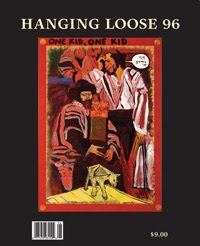
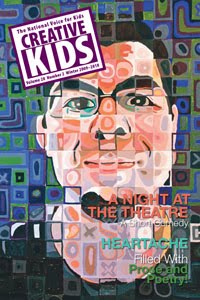 Special thanks to Creative Kids and to Hanging Loose for sending me copies to share with a group of gifted and talented students I taught last week in the workshop, “Publishing a Literary Magazine.” The magazines were great examples of the kinds of magazines young authors can find to read as well at to which they can submit their writing. The young readers/writers were thrilled to know that such publications “just for them” exist.
Special thanks to Creative Kids and to Hanging Loose for sending me copies to share with a group of gifted and talented students I taught last week in the workshop, “Publishing a Literary Magazine.” The magazines were great examples of the kinds of magazines young authors can find to read as well at to which they can submit their writing. The young readers/writers were thrilled to know that such publications “just for them” exist.
Spread the word!
Anthologize This!
Anthologize is a free, open-source, plugin that transforms WordPress 3.0 into a platform for publishing electronic texts. Grab posts from your WordPress blog, import feeds from external sites, or create new content directly within Anthologize. Then outline, order, and edit your work, crafting it into a single volume for export in several formats, including—in this release—PDF, ePUB, TEI. Anthologize is a project of One Week/One Tool, a project of the Center for History and New Media, George Mason University. Funding provided by the National Endowment for the Humanities.
This page of ‘case uses’ includes a list of suggested uses for Anthologize, including turning class blogs into an anthology at the end of the semeter or school year.
Spread the word!
What is Christian Publishing?
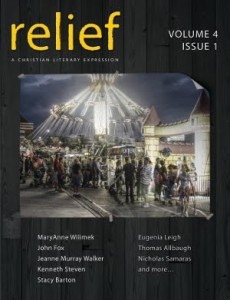 In Relief‘s current issue (V4 I1), Christopher Fisher debuts his first issue as editor by taking on where Relief – a journal of Christian literary expression – “fits in the scheme of contemporary publishing.” And, he writes, “I think of singing and razor wire.” Fisher discusses what Christian publishing has become, and how he recognizes the purely business aspect of the demarcation of what is Christian publishing, but also the perils of such segregation, the “ghettoization of religion.” His editorial, available in full online, is an insightful and provacative commentary on the subject matter. If you’ve been dismissive of “Christian” or religious lit mags in this past, this may well get you to reconsider.
In Relief‘s current issue (V4 I1), Christopher Fisher debuts his first issue as editor by taking on where Relief – a journal of Christian literary expression – “fits in the scheme of contemporary publishing.” And, he writes, “I think of singing and razor wire.” Fisher discusses what Christian publishing has become, and how he recognizes the purely business aspect of the demarcation of what is Christian publishing, but also the perils of such segregation, the “ghettoization of religion.” His editorial, available in full online, is an insightful and provacative commentary on the subject matter. If you’ve been dismissive of “Christian” or religious lit mags in this past, this may well get you to reconsider.
Spread the word!
Two Years of The Write Place at the Write Time
Celebrating its second year of publication, The Write Place At the Write Time is an online literary publication which features fiction, poetry, “Our Stories” – non-fiction, a Writers’ Craft Box of writing essays and resources from professionals in the field, an Exploration of Theme page, Archives of past issues, A Writers’ Contest, fine artwork from artists whose backgrounds include having done work for The New York Times,
Editor-in-Chief Nicole M. Bouchard writes: “Our two-year anniversary issue is up and we encourage new and seasoned writers to send in submissions for the next issue, benefit from resources we provide, read the current issue and enjoy themselves. It’s a supportive writers’ environment dedicated to artistic expression, learning and living the written word. We are a quarterly publication and our writers range from previously unpublished to having written for The New York Times, Newsweek, HBO and Business Week, and they come from all over the US and Europe.”
Spread the word!
New Lit on the Block :: Sliver of Stone
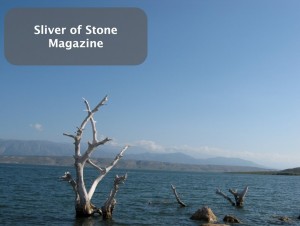 Under the guidance of Founding Editor M.J. Fievre, Sliver of Stone is a bi-annual, online literary magazine dedicated to the publication of work from both emerging and established poets, writers, and visual artists from all parts of the globe. Other hands on deck for Sliver of Stone, “the talented progeny of the Creative Writing Program at Florida International University in Miami, Florida” include: Corey Ginsberg,nonfiction editor; Fabienne S. Josaphat, fiction editor; Marina Pruna, Laura Richardson, Patricia Warman, poetry editors; Holly Mayes, art editor; and Abigail Sedaris, webmaster.
Under the guidance of Founding Editor M.J. Fievre, Sliver of Stone is a bi-annual, online literary magazine dedicated to the publication of work from both emerging and established poets, writers, and visual artists from all parts of the globe. Other hands on deck for Sliver of Stone, “the talented progeny of the Creative Writing Program at Florida International University in Miami, Florida” include: Corey Ginsberg,nonfiction editor; Fabienne S. Josaphat, fiction editor; Marina Pruna, Laura Richardson, Patricia Warman, poetry editors; Holly Mayes, art editor; and Abigail Sedaris, webmaster.
Issue One contributors include: Alan Britt, Alex Alderete, Andrea Askowitz, Andrew Abbott, Changming Yuan, Chloe Nimue Clark, Denise Duhamel , Ernest Williamson III, Gabriela Suarez, Jennifer Hearn, Jessica Barrog, Joe Clifford, John Dufresne, John Riley, John Solensten, Jon Page, Jonathan P. Escoffery, Julia Meylor Simpson, Kim Barnes, Laura Merleau, Mary Christine Delea, Nicholas Garnett, Peter Borrebach, Rae Spencer, Robert E. Wood, Roxanne Hoffman, Russ Hicks, Russell Reece, Samantha Knapp, Sherry O’Keefe , T.J. Beitelman, Terry Sanville, Tim Curtis, Whitney Scott, and Yia Lee.
Sliver of Stone accepts fiction, creative nonfiction, essays (3,500 words or less); poetry, any form or genre (No more than 5 poems); and visual art. The deadline for the next issue is October 31.
Spread the word!
Prism Queer Comics Grant
Every year, Prism awards a significant Queer Press Grant to assist in the publication and promotion of LGBT comics. The grant is funded by donors who are either creators who want to help others just starting out, or fans who want to see more LGBT creators get published. The grant of approximately $2,000 will be awarded to an LGBT cartoonist who is self-publishing a comic book with queer characters and/or themes. Entries are judged first and foremost by artistic merit, followed by concerns such as financial need, proposal presentation, and contribution to the LGBT community. Deadline September 15, 2010.
Spread the word!
Happy Birthday Old Dutch Church
The Old Dutch Church from Washington Irvings’s The Legend of Sleepy Hollow is 325 years old and ready for iPad tours.
Spread the word!
Sycamore Review Online Submissions
Beginning with its new reading period beginning August 1, Sycamore Review will be accepting submissions of poetry, fiction, and personal essays through their online submissions manager. They will no longer accept submissions via traditional post after August 1, 2010. Submissions for their 2010 Wabash Prize in Poetry judged by Jane Hirshfield, however, will continue to be accepted via traditional post.
Spread the word!
Kafka-something-or-other
“Lost Kafka writings have resurfaced, but the legal bureaucracy (legendarily immune to irony) is preventing their publication. There really ought to be some word for things like this.” Gerry Canavan
Spread the word!
Stunning Covers :: Main Street Rag
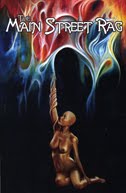 Evolution by Kathy Blackwell
Evolution by Kathy Blackwell
Spread the word!
Novel Excerpt :: Leora Skolkin-Smith
In “The Fragile Mistress,” it’s the summer of 1963 on the Israeli-Jordanian border. A fourteen-year-old American girl is believed to be to be dead, killed by a sniper. The Fragile Mistress is a unpublished excerpt from the novel, Edges, by Leora Skolkin-Smith. The novel, originally published by Grace Paley in 2005, has since been re-titled and expanded for the feature film, The Fragile Mistress, currently in pre-production with Triboro Pictures. It will be shot on location in Jerusalem, Jordan, and New York, and directed by Michael Gunther. Read the excerpt in the latest issue of Guernica, online.
Spread the word!
Books :: Teaching Poetry
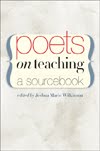 Poets on Teaching: “In response to a lack of source works for wide-ranging approaches to teaching poetry, award-winning poet Joshua Marie Wilkinson has gathered ninety-nine micro-essays for poets, critics, and scholars who teach and for students who wish to learn about the many ways poets think about how a poem comes alive from within—and beyond—a classroom. Not narrowly concerned with how to read poetry or how to write poetry, by virtue of their central concern with teaching poetry, the essays in this fresh and innovative volume address both reading and writing and give teachers and students useful tools for the classroom and beyond.” [University of Iowa Press / 1-58729-904-6 or 978-1-58729-904-9]
Poets on Teaching: “In response to a lack of source works for wide-ranging approaches to teaching poetry, award-winning poet Joshua Marie Wilkinson has gathered ninety-nine micro-essays for poets, critics, and scholars who teach and for students who wish to learn about the many ways poets think about how a poem comes alive from within—and beyond—a classroom. Not narrowly concerned with how to read poetry or how to write poetry, by virtue of their central concern with teaching poetry, the essays in this fresh and innovative volume address both reading and writing and give teachers and students useful tools for the classroom and beyond.” [University of Iowa Press / 1-58729-904-6 or 978-1-58729-904-9]
Spread the word!
The Un-Mississippi Review
What the heck is going on at Mississippi Review? Anna Leigh Clark does a nice job of summing it all up on her blog, Isak: Barthelme Departs, Mississippi Review and Center for Writers in Confusion. As for Barthelme, he and several of his fellow publication staffers carry on at Rick Magazine – which will continue to link to the Mississippi Review Online archives from their site.
Spread the word!
Work for Guernica
Guernica, an online magazine of arts and politics, has several different opportunities available: Special Events Coordinator, Accountant, Blog Intern, Publishing Intern, Editorial Interns.
Spread the word!
Online Post Graduate Fiction Workshops
Shannon Cain (Tupelo Press, recipient of the Pushcart Prize, the O. Henry Prize, and a fellowship from the National Endowment for the Arts) will be leading online post-graduate workshops in fiction along with guest authors/co-leaders Robin Black, Laura van den Berg, and Josh Weil. Workshops are six weeks in length, non-synchronous, and organized in a bulletin board format. (You can browe a sample workshop on the website.) Each week, three participants post their stories for review and commentary by Shannon and the group. In the final half of the workshop, particpants will be joined by a guest co-leader. Each participant will have the opportunity to have one story or chapter workshopped by the guest leader. Workshop size is limited to nine participants.
Spread the word!
On Blurbology
“So when publishing people look at the lineup of testimonials on the back of a new hardcover, they don’t see hints as to what the book they’re holding might be like. Instead, they see evidence of who the author knows, the influence of his or her agent, and which MFA program in creative writing he or she attended. In other words, blurbs are a product of all the stuff people claim to hate about publishing: its cliquishness and insularity . . . It stands to reason that, if many blurbs are bestowed for extraliterary reasons like friendship or professional collegiality, then many of them are insincere.” Laura Miller, Beware of Blurbs, Salon.com
Spread the word!
Audio :: Les & Bi Women’s Erotic Fiction
Newly added to the NewPages Guide to Podcasts, Video, Audio: The BlogTalkRadio program Readings in Les and Bi Women’s Erotic Fiction hosted Lara Zielinsky, a bisexual author of mature adult content lesbian and bi-women’s fiction, romance and erotica. Every other week she shares excerpts and interviews with authors and others involved in the writing and publication of lesbian and bisexual women’s fiction.
Check out the NewPages Guide to Podcasts, Video, Audio for this and many other great literary resources. Know of a one we should consider listing? Drop me a line: denisehill[at]newpages[dot]com
Spread the word!
A Word a Day
Founded in 1994 by Anu Garg, while a graduate student in computer science, A.Word.A.Day (AWAD) is a daily electronic publication from the wordserver at Wordsmith.Org. AWAD includes a vocabulary word, its definition, pronunciation information with audio clip, etymology, usage example, quotation, and other interesting tidbits about words to subscribers every day. You can think of it as a word trek where we explore strange new words. Words are usually selected around a theme every week. At last check, more than 900,000 people in at least 200 countries receive AWAD daily. There is no charge to sign up for AWAD.
Spread the word!
Glimmer Train Short Story Award for New Writers :: August 2010
Glimmer Train has just chosen the winning stories for their Short Story Award for New Writers. This competition is held quarterly and is open to all writers whose fiction has not appeared in a print publication with a circulation greater than 5000. The next Short Story Award competition will take place in August. Glimmer Train’s monthly submission calendar may be viewed here.
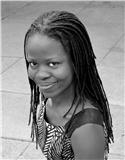 First place: Olufunke Grace Bankole, of El Cerrito, CA, wins $1200 for “26 Bones.” Her story will be published in the Fall 2011 issue of Glimmer Train Stories. [Photo credit: Cheryl Mazak.]
First place: Olufunke Grace Bankole, of El Cerrito, CA, wins $1200 for “26 Bones.” Her story will be published in the Fall 2011 issue of Glimmer Train Stories. [Photo credit: Cheryl Mazak.]
Second place: Joseph Vastano, of Austin, TX, wins $500 for “Entirely Different Places.”
Third place: Natalia Cortes Chaffin of Las Vegas, NV, wins $300 for “The Pig Roast.”
A PDF of the Top 25 winners can be found here.
Spread the word!
Why Teach Multicultural Literature?
Multicultural Literature: Literature Changes Lives by Dr. Darrel Hoagland, a former elementary and middle school teacher who lives in New Bedford, MA and Philadelphia, PA. (from the Changing Lives Through Literature blog)
Spread the word!
Vanishing Point
Vanishing Point is not a memoir. It says so in the bottom right corner on the cover. On the back of the book, it says “Literature/Essays.” In this book, Ander Monson serves on a jury, spends time at Panera Bread, details his self-Googling results, and devotes a section to the flavors of Doritos. But Vanishing Point is about all of us. How the I of my life, of your life, of every life, blends together and vanishes, at least a little. Continue reading “Vanishing Point”
Spread the word!
Black Box Theater as Abandoned Zoo
Winner of the 2008 Concrete Wolf Chapbook Competition, Dana Elkun’s Black Box Theater as Abandoned Zoo offers a guided tour of a rich, imagined landscape. The cover of the volume features a pair of monkeys, perched on a bed, releasing butterfly silhouettes into the air. Underneath the enigmatic cover art, 15 sophisticated yet accessible poems treat topics as varied as marriage, medicine, and history. Continue reading “Black Box Theater as Abandoned Zoo”
Spread the word!
How to Catch a Falling Knife
The greatest strength in How to Catch a Falling Knife, Daniel Johnson’s first collection of poems, is its chosen silences. While that may sound like strange praise, this book’s sparseness gives it a paradoxical power where the poet’s ability to know what not to say and when allows what he does say to starkly shine in the same way that it is more arresting to see one light left on in a house you gaze at from the dark street than it is when all the windows are festively blazing. Continue reading “How to Catch a Falling Knife”
